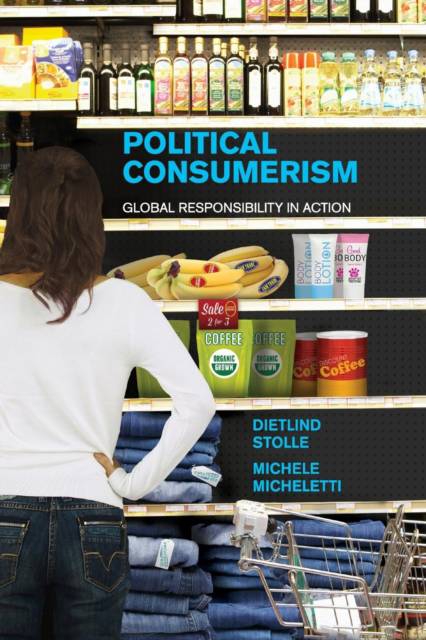
Door een staking bij bpost kan je online bestelling op dit moment iets langer onderweg zijn dan voorzien. Dringend iets nodig? Onze winkels ontvangen jou met open armen!
- Afhalen na 1 uur in een winkel met voorraad
- Gratis thuislevering in België vanaf € 30
- Ruim aanbod met 7 miljoen producten
Door een staking bij bpost kan je online bestelling op dit moment iets langer onderweg zijn dan voorzien. Dringend iets nodig? Onze winkels ontvangen jou met open armen!
- Afhalen na 1 uur in een winkel met voorraad
- Gratis thuislevering in België vanaf € 30
- Ruim aanbod met 7 miljoen producten
Zoeken
Political Consumerism
Global Responsibility in Action
Dietlind Stolle, Michele Micheletti
Paperback | Engels
€ 67,95
+ 135 punten
Uitvoering
Omschrijving
Political Consumerism captures the creative ways in which citizens, consumers, and political activists use the market as their arena for politics. This book theorizes, describes, analyzes, compares, and evaluates the phenomenon of political consumerism and how it attempts to use market choice to solve complex globalized problems. It investigates theoretically and empirically how and why consumers practice citizenship and have become important political actors. Dietlind Stolle and Michele Micheletti describe consumers' engagement as an example of individualized responsibility taking, examining how political consumerism nudges and pressures corporations to change their production practices, and how consumers emerge as a force in global affairs. Unlike other studies, it also evaluates if and how consumer actions become effective mechanisms of global change. Stolle and Micheletti offer a candid discussion of the limitations of political consumerism as a form of participation and as a problem-solving mechanism.
Specificaties
Betrokkenen
- Auteur(s):
- Uitgeverij:
Inhoud
- Aantal bladzijden:
- 382
- Taal:
- Engels
Eigenschappen
- Productcode (EAN):
- 9781107567290
- Verschijningsdatum:
- 8/10/2015
- Uitvoering:
- Paperback
- Formaat:
- Trade paperback (VS)
- Afmetingen:
- 152 mm x 229 mm
- Gewicht:
- 508 g

Alleen bij Standaard Boekhandel
+ 135 punten op je klantenkaart van Standaard Boekhandel
Beoordelingen
We publiceren alleen reviews die voldoen aan de voorwaarden voor reviews. Bekijk onze voorwaarden voor reviews.











